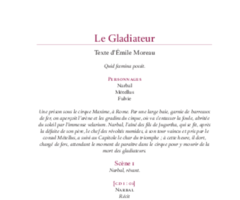Le Gladiateur
Le Gladiateur,to a libretto by Émile Moreau, was composed for the final round of the Prix de Rome competition, held from 19 May to 13 June 1883. When the cantatas were presented at the Institut de France on 23 June, Debussy had the good fortune of hearing his work sung by three excellent artists: Gabrielle Krauss, Alexandre Taskin and Antoine Muratet. Paul Vidal (a pupil of Massenet) won the prize; Debussy’s cantata came second. The judges commented, “Generous musical nature but ardent to the point of intemperance”. Yet Debussy had tried to conform to the current conventions by expressing a strong lyricism that is particularly noticeable in the incandescent duo for Fulvie and Narbal,“Trop tard, j’ai compris ton émoi”. The two lovers often sing parallel lines (or even in unison) and hurl themselves passionately towards the high register (Debussy was soon to banish such features from his work). The orchestra, rather sombre and compact, sounds the virile brass fanfares imposed by the subject. Moreover, the title of the cantata draws attention to the principal male character (it was more common at that time to have a heroine), the gladiator being perhaps a figure with which the Third Republic could identify. The jury noted “some gripping dramatic accents”, indicating in all likelihood that it considered Debussy’s work too Wagnerian to receive the coveted first prize. Today we perceive clearly, however, that the harmonic progressions and orchestral combinations are in no way indebted to the master of Bayreuth.


